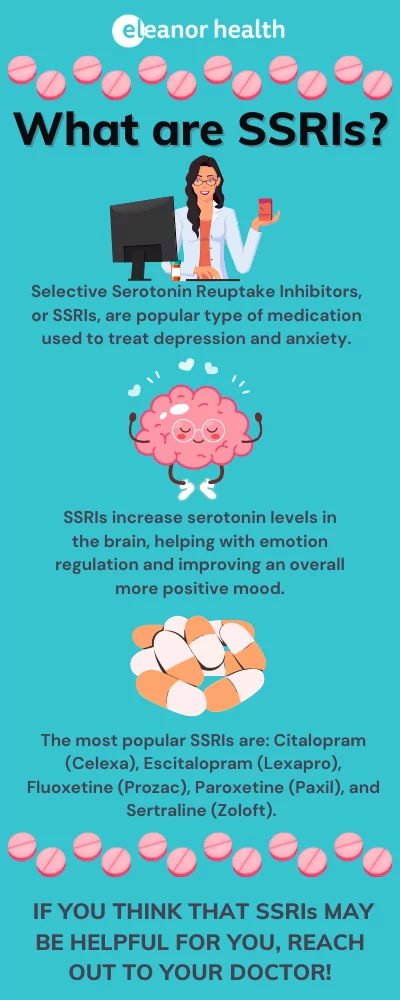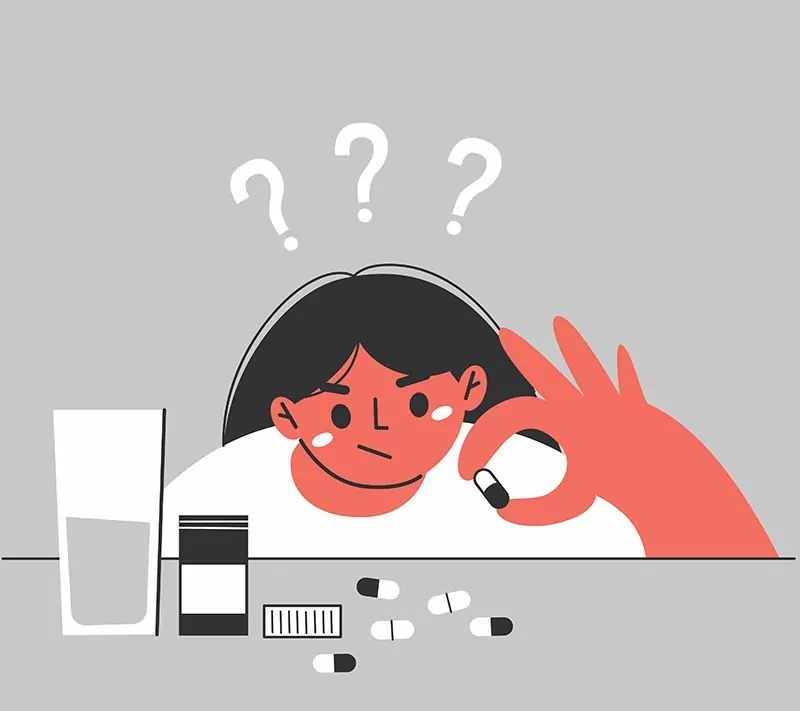Selective Serotonin Reuptake Inhibitors, or SSRIs, are a widely used type of medication primarily used to treat depression and anxiety. SSRIs are popular because they tend not to produce many serious side effects or dependency issues like other medications. Although they are so commonly used, it is still essential to know the specific properties of SSRIs to learn what they are doing to your body and mind. Keep reading for an overview all about SSRIs!
Anxiety is a natural and healthy feeling. It derives from our innate human response to potential dangers. However, when the anxiety presents itself in response to stimuli that are not dangerous or threatening and becomes disruptive to your daily functioning, it can turn into an anxiety disorder:
Depression, although relatively common, is a serious mental illness that negatively impacts how one feels, thinks, and acts regarding their experiences. Like many mental disorders, various types of depression have different causes. Here are the most common types of depression and how they can appear:
To put it plainly, SSRIs work by increasing the level of serotonin in the brain. Serotonin is a neurotransmitter that carries messages from your nerve cells to your brain and throughout the rest of your body, affecting how your body works. Serotonin positively affects your mood, emotions, ability to sleep, sex drive, and memory. When the brain produces a normal amount of serotonin, it helps regulate and reduce feelings of anxiety and depression. However, some individuals have a lower level of serotonin in their brains than is typical, which can cause mental health issues like anxiety and depression. Taking SSRIs helps increase your serotonin levels, making you more susceptible to emotion regulation techniques and therapy and improving an overall more positive mood [1].
Although SSRIs were created primarily for the treatment of depression, they have completely revolutionized the treatment of anxiety and have become a “first-line” medication for anxiety [2]. The emergence of SSRIs in 1974 de-popularized the use of benzodiazepines to treat anxiety disorders, as SSRIs have been considered safer and less addictive than other anxiety-treating medications [2]. This is why SSRIs, an antidepressant group of medications, are so commonly used to treat anxiety and depression.

There are a handful of types of SSRIs commonly prescribed to treat both anxiety and depression. Although all medications tend to work in the same way and have a similar chemical makeup, there are slight differences in each of them. The decision about which SSRI is best for you is best left up to your doctor’s expertise. The most popular SSRIs are:
Although SSRIs are generally safe and low in side effects, they can sometimes cause significant side effects. Fortunately, most people who take SSRIs only experience mild side effects (if any), which tend to subside the longer they are on the medication [1]. For example, those new to SSRIs may encounter mild side effects, like nausea, during the first few weeks of starting the medication, which subsides over time. Typically, side effects begin to occur during the first two weeks of taking an SSRI and subside in a few weeks [11] when the body fully adjusts to the new medication.
Below are the most common side effects of SSRIs:
*may persist longer than the first few weeks of starting SSRI
It is necessary to continue taking the prescribed SSRI regularly, even if mild side effects persist. This is because SSRI medications take several weeks for you to benefit from their impact and see a difference in your levels of anxiety and depression [2]. By that time, the benefits of the medication and the improvement of feelings of anxiety and depression should outweigh the negatives of mild side effect(s).
*associated with “Serotonin Syndrome.”
If you experience serious side effects, contact your doctor immediately. They are uncommon but can be a sign of Serotonin Syndrome, which occurs when the level of serotonin in your brain becomes dangerously high. If you experience symptoms associated with Serotonin Syndrome, stop taking the medication and contact your doctor or emergency help immediately.
While SSRIs aren’t known to be highly addictive, stopping your treatment abruptly or missing a few doses in a row can create withdrawal-like symptoms. These withdrawal symptoms are better known as “Antidepressant Discontinuation Syndrome.” They are relatively common, occurring in 20% of patients who quit their SSRIs all at once after at least six weeks of continued usage. This is because most SSRIs (excluding Prozac) have a short half-life, meaning that missing just a dose or two will likely abruptly diminish the SSRI concentration in the bloodstream. This, in turn, makes it more likely for the individual to experience side effects comparable to withdrawal symptoms.
The approximate half-life of the most common SSRI medications are:
SSRIs can cause changes in the brain that affect serotonin receptors, creating a period of adjustment and withdrawal when medication is stopped abruptly. The brain will “down-regulate” the receptors, so there is a balance between serotonin and receptors, leaving a sudden decrease in serotonin and down-regulated receptors when treatment is stopped. You are likely to experience unpleasant side effects after this.
Common SSRI withdrawal symptoms are often described as “flu-like” symptoms or feeling the sudden re-emergence of anxiety and depression. Although these symptoms may be distressing, they are typically not severe. Common symptoms include:
*more rare/concerning symptoms. If you experience these, contact a doctor or professional immediately.
If you think that SSRIs may be helpful to you, reach out to your healthcare provider so you can work together to find the right medication for you!
Eleanor Health is here to help you build your confidence and momentum towards the future you want. We provide treatment services for adults with alcohol, opioid, and other substance use disorders. We are currently located in Louisiana, Massachusetts, North Carolina, New Jersey, Ohio, Texas, and Washington.
 What are the side effects of Prozac (Fluoxetine)?
What are the side effects of Prozac (Fluoxetine)?
 Mixing Lexapro and Alcohol: Side Effects and Risks
Mixing Lexapro and Alcohol: Side Effects and Risks
 Medication For Anxiety and Depression Medication: A Guide
Medication For Anxiety and Depression Medication: A Guide